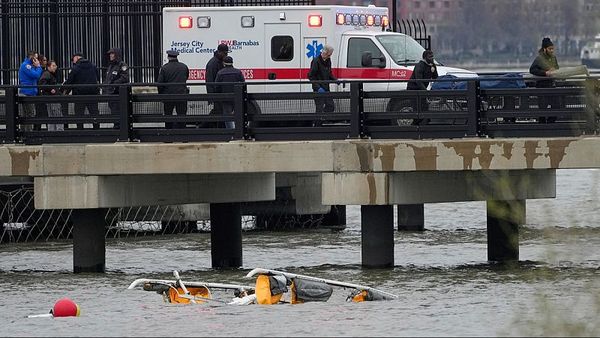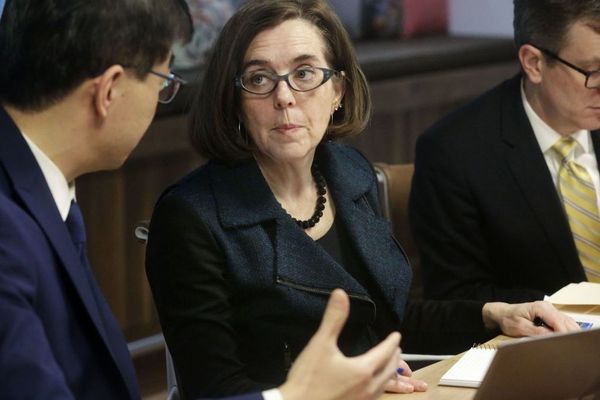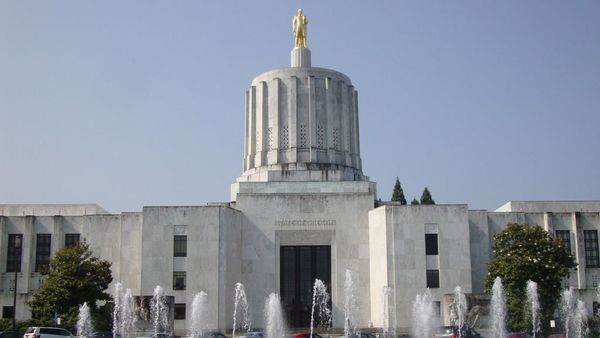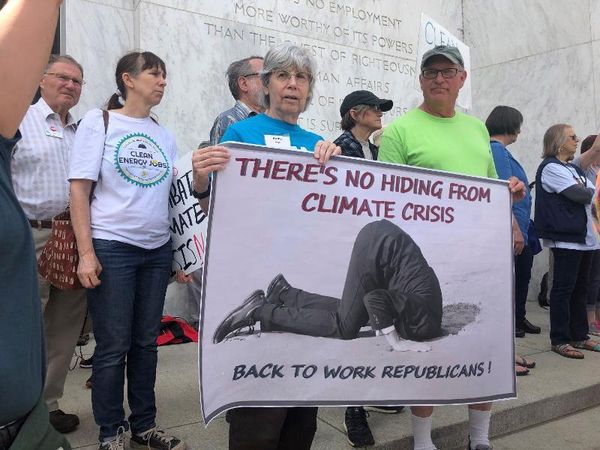
SALEM, Ore. — His weary voice emerging from a speakerphone as he spoke from an “undisclosed location,” state Sen. Herman Baertschiger told reporters gathered in his office Tuesday afternoon that he and his fellow Republicans weren’t ready to return to Oregon.
The hastily organized news conference followed an announcement from Senate President Peter Courtney, the Democratic leader, that he didn’t have enough votes to pass the controversial climate bill that had prompted the Republican senators to flee the state to deny Democrats a quorum.
But Baertschiger said some lawmakers still didn’t want to come back to the state before the session ends Sunday. They fear a trick. They worry that the Democrats may pivot again and scrounge together enough votes to pass the bill.
“It saddens me that we have to do this. This is not easy; it is not comfortable; it is not a good feeling,” Baertschiger said. “This session has been horrible. It has been anything but bipartisan.”
The bizarre and unnerving eruption of partisan warfare here, which escalated to threats of militia violence and a one-day closure of the state Capitol for security concerns, took another stunning turn Tuesday when the climate bill — which would cut greenhouse gas emissions through a market-based cap-and-trade system — suddenly appeared to all but die.
“House Bill 2020 does not have the votes on the Senate floor. That will not change,” Courtney said during a brief morning session in the Senate chamber. He proceeded to espouse the need to pass 125 other bills that have been stalled by the Republican walkout.
The climate bill, years in the making, would have put Oregon in league with California as a state aggressively attacking climate change by ratcheting down allowable emissions and enabling companies to buy and sell allowances.
The bill slammed into powerful business interests, facing opposition from the Alliance of Western Energy Consumers, which represents industrial energy users, such as utility companies, paper mills and factories.
Citizen climate advocates seated in the Senate gallery were so shocked by Courtney’s announcement Tuesday that they spontaneously stood up and turned their backs on him.
“I would burst into tears, except I’m so angry I can’t,” activist K.B. Mercer said in the Senate chamber.
“It was a kick to the stomach,” said fellow climate advocate Brian Ettling.
Outside, on the Capitol steps, a couple hundred climate advocates staged a rally, many of them furious about the turn of events.
“Hey, hey. Ho, ho. President Courtney has got to go!” they chanted.
Some state officials said they feared that the political chaos was a sign that the extreme polarization and hardball tactics employed in the nation’s capital — where partisans draw lines in the sand, demonize their opponents and play to their political bases — had spread to Oregon.
The dysfunction along the Potomac found its echo along the Willamette.
“Unfortunately the chaos and corruption of Washington, D.C., are coming to Oregon, my Oregon,” Gov. Kate Brown (D) told The Washington Post in her statehouse office. “Oregon government used to function. They literally shut down the legislative branch. Eleven people took their marbles and went home.”
But the Republican lawmakers said the Democrats misled them into thinking that there would be alterations to the bill after it passed the House. Speaking from out of state Tuesday, Republican Sen. Tim Knopp said he wanted Oregon residents to be able to vote on the policy in a special ballot initiative.
“We were led to believe that we would have real opportunities to negotiate and make sure the voices of all Oregonians were being considered,” Knopp said in a written statement released last week.
This was not the first Republican walkout of the session. In May, GOP legislators left to protest a Democratic bill to create a new business tax. The Republicans stayed in the state, however, and Brown negotiated with Baertschiger, their leader, to broker a deal, tabling two bills the Republicans opposed: one covering gun restrictions, the other narrowing vaccine exemptions. The Republicans agreed to come back to Salem and stay around for the rest of the session.
But last week, the GOP senators bolted.
When Courtney signaled that the climate bill wouldn’t pass, it seemed that the Republican walkout had worked, or at least changed the dynamic in the statehouse.
“Is this how we do business in Oregon now?” said Meredith Connolly, the state director for a nonprofit organization called Climate Solutions. “I think this is a very dark day for our democratic process in Oregon.”
Even before this recent partisan clash, the Republicans found ways to thwart the Democrats. In the House, they began refusing to waive a constitutional requirement that each bill be read aloud, in its entirety, on the floor. Some bills are dozens of pages long, and a reading can take hours. This created such a backlog that the House still has a stack of bills it must consider with only a few days left in the session.
“With the walkout, we’ve taken parliamentary procedure and thrown it out the window,” said Jim Moore, a political science professor at Pacific University who studies Oregon politics.
Democrats outnumber Republicans 18 to 11 in the Oregon Senate. They need 16 votes to pass the climate bill.
In recent days, the situation took on a menacing atmosphere. After the 11 Republican lawmakers fled, Brown ordered the state police to retrieve them — “Please go get them. Do not put anyone’s lives at risk,” she recalls saying — but the lawmakers had scattered across state lines. In a television interview, Sen. Brian Boquist strongly implied that he would violently resist arrest if state troopers tried to bring him back to the statehouse: “Send bachelors and come heavily armed,” he said.
The statehouse closed for security reasons Saturday after threats left authorities worried that far-right “militia” members carrying firearms would storm the capitol.
Knopp, one of the 11 senators, stayed on the move — four states in four days — before finally hunkering down in an undisclosed location.
“I’m in a cabin by a lake in Idaho,” he said. “I’ve arrived in free America.”
Speaking from his hideout Tuesday, Knopp said he hadn’t decided whether to return to Salem, saying his caucus needs more details on what, exactly, the Democrats intend to do with the climate bill .
“I think we need some clarity on what the Senate president said today. Obviously we’re very interested, and it sounds like a step in the right direction,” Knopp said.
It would take 24 to 36 hours for the Republicans to reassemble in Salem if they did decide to return. Some have driven 10 or 15 hours from the state capital, and one member is on the East Coast, Knopp noted.
Brown, meanwhile, signaled that the climate bill wouldn’t pass this session. Speaking to demonstrators outside the capital, she said: “It’s going to take some time, it’s going to take persistence, and it’s going to take passion. Do you have the passion?”
The bill’s opponents have sometimes described the debate in culture-war terms: urban vs. rural, liberal elites vs. farmers and loggers.
“I have a lot of friends who don’t even own a car. They’re not going to feel the impact at all,” said Andrew Miller, owner of Portland-based Stimson Lumber. By contrast, low-income workers who drive long distances or work in fuel-intensive industries will suffer, he said.
Backers of the bill said there are provisions to put money back into rural areas and protect poor people. They speak of the climate crisis as an existential threat that has to be answered within 11 years, a date derived from a recent United Nations report.
Brad Reed, a spokesman for Renew Oregon, a coalition of business, labor, health-care and advocacy organizations backing HB2020, said the bill would funnel revenue back into rural areas for such purposes as wildfire suppression, levee construction and farm irrigation. He said the cap on emissions would eliminate about 2 million tons of carbon from the atmosphere each year. “That’s the equivalent to taking a coal-fired power plant offline,” he said.
Courtney’s announcement Tuesday, and the possibility that Republicans could return, means the Senate may be able to take up the dozens of bills that are in limbo. They include money for 40 more state troopers; predator and invasive-species control in rural areas; wildfire suppression; levee construction; and child welfare and mental health programs.
No one seems to know what’s going to happen from day to day, or even hour to hour. But the legislative session will end Sunday night at midnight. That’s a hard stop.
The Capitol gift shop is selling T-shirts that say “I survived the 80th legislative assembly,” but that message may be prematurely optimistic.










